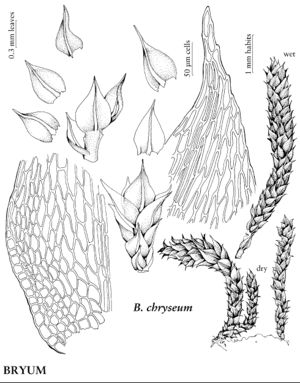Bryum chryseum
J. Linn. Soc., Bot. 12: 304. 1869.
Plants gregarious or in dense mats, shiny golden yellow to yellow-green, rarely pale green. Stems 0.5–1 cm, weakly julaceous. Leaves erect when moist, triangular to ovate, concave, 0.5–1 mm; base concolorous; margins rarely recurved proximally or plane distally; apex acuminate to acute, not cucullate, not hyaline; costa long-excurrent, awn slender, pigmented; proximal laminal cells quadrate or short-rectangular, 12–18 µm wide, 1–2:1; distal cells elongate-hexagonal to vermicular, (50–)60–90 × 8–12 µm, (4–)6–8:1, walls thin to somewhat firm, not strongly incrassate. Specialized asexual reproduction absent. Seta red, 1–2 cm. [Capsule brown, clavate to pyriform, 3–4 mm; hypophysis slender, not differentiated. Spores (8–)10–15 µm].
Habitat: Soil, Mediterranean and other seasonally dry climates
Elevation: moderate elevations (200-800 m)
Distribution

Calif., Mexico, Central America, South America (Bolivia, Chile, Colombia, Peru).
Discussion
Bryum chryseum was found in California in Fresno, Madera, and Mendocino counties in native plant communities by D. Toren and K. Heise (2009). Bryum chryseum is characteristic of seasonally dry climates from Mexico to Chile. The small plant size, golden color, and triangular leaves with strong excurrent costae are diagnostic. The species is superficially very similar to B. lanatum, but lacks the hyaline lamina and hoary white color of that species. Depauperate material from Arizona with somewhat hyaline awns collected by N. G. Miller from calcareous sandy soil near Wilcox may belong to this species rather than to the gametophytically similar Leptostomopsis nivea. The latter differs from B. chryseum in hyaline awns, serrate distal leaf margins, and numerous extremely incrassate and vermicular distal laminal cells. Bryum chryseum has red rhizoids in clusters on the proximal stems, recurved costal awns when dry, exostomes sometimes reduced, and sometimes short or absent cilia. The sporophyte information here is from Mexican material.
Selected References
None.
